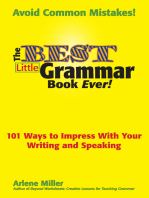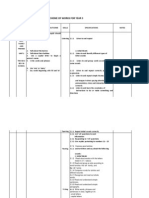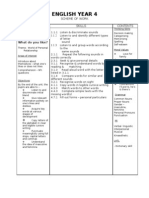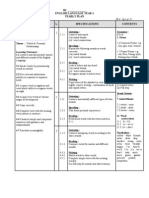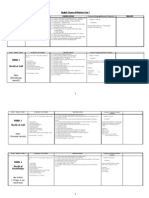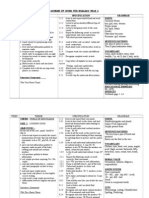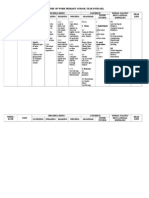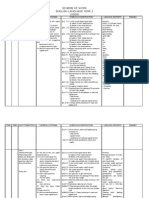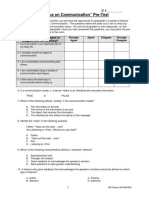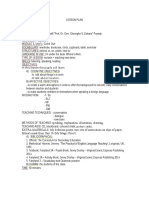Yearly Plan English Yr.4
Yearly Plan English Yr.4
Uploaded by
Noraini Sha'riCopyright:
Available Formats
Yearly Plan English Yr.4
Yearly Plan English Yr.4
Uploaded by
Noraini Sha'riOriginal Description:
Copyright
Available Formats
Share this document
Did you find this document useful?
Is this content inappropriate?
Copyright:
Available Formats
Yearly Plan English Yr.4
Yearly Plan English Yr.4
Uploaded by
Noraini Sha'riCopyright:
Available Formats
PREPARED BY : PN NORAINI SHARI 2009
YEARLY PLAN / SCHEME OF WORK ENGLISH LANGUAGE YEAR 4
WEEK 1 THEMES/TOPICS World of Personal Relationship Unit 1 What do you like? Textbook page: 1,2 L/OUTCOMES Pupils should be able to : listen to and discriminate initial blends words that begin with /tw/ , /sk/ and /sw/ sounds give relevant information politely on ones likes and dislikes acquire key words at various stages of development copy letters of the alphabet in clear and legible cursive writing punctuate meaningfully full stops, capital letters and commas understand the idea of masculine and feminine LEVEL Level 1 Level 2 Level 3 Level 1 Level 2 Level 1 Level 2 Level 3 Level 1 Level 3 SPECIFICATIONS 1.1.1 Listen to and repeat (vii) initial blends (xi) word contractions 1.1.2 Listen to and identify different types of letter sounds 1.1.3 Listen to and group words according to the same sounds 2.1.1 Repeat the following sounds in words correctly 2.3.3 Talk about personal experiences 3.1.1 Look at letters and say aloud 3.2.1 Recognise complete words in texts 3.1.3 Read aloud word with the letters listed in 3.1.1 3.1.4 Compare words for similar and different sounds 4.1.1 Copy letters of the alphabet in clear and legible cursive writing combination of small and capital letters 4.3.3 Match words to other words 4.4.3 Complete simple texts with the missing words 4.7.1 Use full stop for initials and abbreviations. 1.1.1 Listen to and repeat (vii) initial blends (xi) word contractions 1.1.2 Listen to and identify different types of letter sounds 1.1.3 Listen to and group words according to the same sounds 2.1.1 Repeat the following sounds in words correctly 2.3.3 Talk about personal experiences 3.1.1 Look at letters and say aloud 3.2.1 Recognise complete words in texts 3.1.3 Read aloud word with the letters listed in 3.1.1 3.1.4 Compare words for similar and different sounds 4.1.1 Copy letters of the alphabet in clear and legible cursive writing combination of small NOTES GRAMMAR 1. Nouns - Common Nouns - Proper Nouns - Gender 2. Pronouns - Personal pronouns 3. Punctuation - Capital letters - Full stop 4. Initial blends - tw/tw/-twist - sk/sk/- skate - sw/sw/-swim 5. Word contractions - ll-lll - re-were - nt-dont
World of Personal Relationship Unit 1 What do you like? Textbook page: 3,4,5
Pupils should be able to : listen to and discriminate initial blends words that begin with /tw/ , /sk/ and /sw/ sounds give relevant information politely on ones likes and dislikes acquire key words at various stages of development copy letters of the alphabet in clear and legible cursive writing punctuate meaningfully full stops, capital letters
Level 1 Level 2 Level 3 Level 1 Level 2 Level 1 Level 2 Level 3 Level 1 Level 3
GRAMMAR 1. Nouns - Common Nouns - Proper Nouns - Gender 2. Pronouns - Personal pronouns 3. Punctuation - Capital letters - Full stop 4. Initial blends - tw/tw/-twist - sk/sk/- skate - sw/sw/-swim 5. Word contractions
PREPARED BY : PN NORAINI SHARI 2009
and commas understand the idea of masculine and feminine
WEEK 3
THEMES/TOPICS World of Personal Relationship Unit 1 What do you like? Textbook page:6,7 8,9,10,
L/OUTCOMES Pupils should be able to : listen to and discriminate initial blends words that begin with /tw/ , /sk/ and /sw/ sounds give relevant information politely on ones likes and dislikes acquire key words at various stages of development copy letters of the alphabet in clear and legible cursive writing punctuate meaningfully full stops, capital letters and commas understand the idea of masculine and feminine
LEVEL Level 1 Level 2 Level 3 Level 1 Level 2 Level 1 Level 2 Level 3 Level 1 Level 3
World of Personal Relationship Unit 1 What do you like? Textbook page: 11,12,13,14
Pupils should be able to : listen to and discriminate initial blends words that begin with /tw/ , /sk/ and /sw/ sounds give relevant information politely on ones likes and dislikes acquire key words at various stages of development copy letters of the alphabet in clear and legible cursive writing punctuate meaningfully
Level 1 Level 2 Level 3 Level 1 Level 2 Level 1 Level 2 Level 3 Level 1 Level 3
and capital letters 4.3.3 Match words to other words 4.4.3 Complete simple texts with the missing words 4.7.1 Use full stop for initials and abbreviations. SPECIFICATIONS 1.1.1 Listen to and repeat (vii) initial blends (xi) word contractions 1.1.2 Listen to and identify different types of letter sounds 1.1.3 Listen to and group words according to the same sounds 2.1.1 Repeat the following sounds in words correctly 2.3.3 Talk about personal experiences 3.1.1 Look at letters and say aloud 3.2.1 Recognise complete words in texts 3.1.3 Read aloud word with the letters listed in 3.1.1 3.1.4 Compare words for similar and different sounds 4.1.1 Copy letters of the alphabet in clear and legible cursive writing combination of small and capital letters 4.3.3 Match words to other words 4.4.3 Complete simple texts with the missing words 4.7.1 Use full stop for initials and abbreviations. 1.1.1 Listen to and repeat (vii) initial blends (xi) word contractions 1.1.2 Listen to and identify different types of letter sounds 1.1.3 Listen to and group words according to the same sounds 2.1.1 Repeat the following sounds in words correctly 2.3.3 Talk about personal experiences 3.1.1 Look at letters and say aloud 3.2.1 Recognise complete words in texts 3.1.3 Read aloud word with the letters listed in 3.1.1 3.1.4 Compare words for similar and different sounds 4.1.1 Copy letters of the alphabet in clear and
- ll-lll - re-were - nt-dont
NOTES GRAMMAR 1. Nouns - Common Nouns - Proper Nouns - Gender 2. Pronouns - Personal pronouns 3. Punctuation - Capital letters - Full stop 4. Initial blends - tw/tw/-twist - sk/sk/- skate - sw/sw/-swim 5. Word contractions - ll-lll - re-were - nt-dont
GRAMMAR 1. Nouns - Common Nouns - Proper Nouns - Gender 2. Pronouns - Personal pronouns 3. Punctuation - Capital letters - Full stop 4. Initial blends - tw/tw/-twist - sk/sk/- skate - sw/sw/-swim 5. Word
PREPARED BY : PN NORAINI SHARI 2009
full stops, capital letters and commas understand the idea of masculine and feminine
World of Knowledge Unit 2 Looking Good Textbook page : 15,16,17 THEMES/TOPICS
WEEK
Pupils should be able to : listen to and repeat accurately the correct pronunciation of words that end with final consonants l/l, p/p/, b/b L/OUTCOMES give relevant information politely to enquiries made on parts of the body, clothing and ordinal and cardinal numbers ask questions politely to obtain information ask simple questions requiring Yes/No replies read and understand phrases, sentences and short paragraphs on how to keep clean read and enjoy simple poems copy words and phrases in clear legible cursive writing write words using simple present tense differentiate between singular and plural forms
Level 1 Level 2 Level 3
legible cursive writing combination of small and capital letters 4.3.3 Match words to other words 4.4.3 Complete simple texts with the missing words 4.7.1 Use full stop for initials and abbreviations. 1.1.1 Listen to and repeat (ii) final consonants 1.2.2 Listen to and repeat correctly phrases and expressions 1.3.5 Listen to and understand ordinal numbers : Scope : 10th 15th SPECIFICATIONS 2.2.1 Ask Wh questions to seek information 2.3.1 Name or identify objects, parts of the body etc 2.6.2 State whether one likes or does not like the story heard or read 2.3.5 Give replies pertaining to ordinal numbers: 10th 15th 3.3.2 Read and understand simple sentences 4.6.1 Spell words that are given to be memorized 4.6.3 Take dictation of paragraphs given to be learnt
contractions - ll-lll - re-were - nt-dont
GRAMMAR 1. Nouns -number (singular and plural)
LEVEL Level 1 Level 1 Level 2 Level 3 Level 2 Level 1 Level 3
NOTES 2. Subject-verb agreement 3. Simple Present Tense 4. Final consonants - l/l fall - p/p lap 5. Stress - compound words
PREPARED BY : PN NORAINI SHARI 2009
World of Knowledge Unit 2 Looking Good Textbook page : 18,19,20
WEEK 7
THEMES/TOPICS World of Knowledge Unit 2 Looking Good Textbook page : 21,22,23,24
Pupils should be able to : listen to and repeat accurately the correct pronunciation of words that end with final consonants l/l, p/p/, b/b give relevant information politely to enquiries made on parts of the body, clothing and ordinal and cardinal numbers ask questions politely to obtain information ask simple questions requiring Yes/No replies read and understand phrases, sentences and short paragraphs on how to keep clean read and enjoy simple poems copy words and phrases in clear legible cursive writing write words using simple present tense differentiate between singular and plural forms L/OUTCOMES Pupils should be able to : listen to and repeat accurately the correct pronunciation of words that end with final consonants l/l, p/p/, b/b give relevant information politely to enquiries made on parts of the body, clothing and ordinal and cardinal numbers ask questions politely to obtain information ask simple questions requiring Yes/No replies
Level 1 Level 2 Level 3 Level 1 Level 1 Level 2 Level 3 Level 2 Level 1 Level 3
1.1.1 Listen to and repeat (ii) final consonants 1.2.2 Listen to and repeat correctly phrases and expressions 1.3.5 Listen to and understand ordinal numbers : Scope : 10th 15th 2.2.1 Ask Wh questions to seek information 2.3.1 Name or identify objects, parts of the body etc 2.6.2 State whether one likes or does not like the story heard or read 2.3.5 Give replies pertaining to ordinal numbers: 10th 15th 3.3.2 Read and understand simple sentences 4.6.1 Spell words that are given to be memorized 4.6.3 Take dictation of paragraphs given to be learnt
2. Subject-verb agreement 3. Simple Present Tense 4. Final consonants - l/l fall - p/p lap 5. Stress - compound words
LEVEL Level 1 Level 2 Level 3 Level 1 Level 1 Level 2 Level 3 Level 2 Level 1 Level 3
SPECIFICATIONS 1.1.1 Listen to and repeat (ii) final consonants 1.2.2 Listen to and repeat correctly phrases and expressions 1.3.5 Listen to and understand ordinal numbers : Scope : 10th 15th 2.2.1 Ask Wh questions to seek information 2.3.1 Name or identify objects, parts of the body etc 2.6.2 State whether one likes or does not like the story heard or read 2.3.5 Give replies pertaining to ordinal numbers: 10th 15th 3.3.2 Read and understand simple sentences 4.6.1 Spell words that are given to be memorized 4.6.3 Take dictation of paragraphs given to be
NOTES 2. Subject-verb agreement 3. Simple Present Tense 4. Final consonants - l/l fall - p/p lap 5. Stress - compound words
PREPARED BY : PN NORAINI SHARI 2009
World of Knowledge Unit 2 Looking Good Textbook page : 25,26,27,28
read and understand phrases, sentences and short paragraphs on how to keep clean read and enjoy simple poems copy words and phrases in clear legible cursive writing write words using simple present tense differentiate between singular and plural forms Pupils should be able to : listen to and repeat accurately the correct pronunciation of words that end with final consonants l/l, p/p/, b/b give relevant information politely to enquiries made on parts of the body, clothing and ordinal and cardinal numbers ask questions politely to obtain information ask simple questions requiring Yes/No replies read and understand phrases, sentences and short paragraphs on how to keep clean read and enjoy simple poems L/OUTCOMES copy words and phrases in clear legible cursive writing write words using simple present tense differentiate between singular and plural forms Pupils should be able to:
learnt
Level 1 Level 2 Level 3 Level 1 Level 1 Level 2 Level 3 Level 2 Level 1 Level 3
1.1.1 Listen to and repeat (ii) final consonants 1.2.2 Listen to and repeat correctly phrases and expressions 1.3.5 Listen to and understand ordinal numbers : Scope : 10th 15th 2.2.1 Ask Wh questions to seek information 2.3.1 Name or identify objects, parts of the body etc 2.6.2 State whether one likes or does not like the story heard or read 2.3.5 Give replies pertaining to ordinal numbers: 10th 15th 3.3.2 Read and understand simple sentences 4.6.1 Spell words that are given to be memorized 4.6.3 Take dictation of paragraphs given to be learnt
2. Subject-verb agreement 3. Simple Present Tense 4. Final consonants - l/l fall - p/p lap 5. Stress - compound words
WEEK
THEMES/TOPICS
LEVEL
SPECIFICATIONS
NOTES
World of Knowledge
Level 1
1.1.1 Listen to and repeat (viii) final blends
1. Nouns
PREPARED BY : PN NORAINI SHARI 2009
Unit 3 Healthy Living Textbook page : 29,30,31,32
read and understand simple sentences use countable and uncountable nouns give instructions to prepare food complete text with missing words listen and practice words that end with nk, lt, mp, ft and nd.
Level 1 Level 1 Level 2 Level 1 Level 2 Level 2
1.4.2 Listen to and follow simple instruction in preparing food 2.1.4 Ask questions with the correct intonation 3.7.1 Read and group words according to alphabetical order 3.4.2 Read aloud words and phrases, pronouncing them correctly 4.2.2 Write words and phrases in clear and legible cursive writing 4.8.2 Write simple sentences with word and picture cues
1.1 Countable nouns 1.2 Uncountable nouns 3. Pronouns 3.2 Demonstrative pronouns(refer to a noun) 3.3 Possessive adjectives 8. Modals must have to
10
World of Knowledge Unit 3 Healthy Living Textbook page : 33,34,35
Pupils should be able to: read and understand simple sentences use countable and uncountable nouns give instructions to prepare food complete text with missing words listen and practice words that end with nk, lt, mp, ft and nd.
Level 1 Level 1 Level 1 Level 2 Level 1 Level 2 Level 2
1.1.1 Listen to and repeat (viii) final blends 1.4.2 Listen to and follow simple instruction in preparing food 2.1.4 Ask questions with the correct intonation 3.7.1 Read and group words according to alphabetical order 3.4.2 Read aloud words and phrases, pronouncing them correctly 4.2.2 Write words and phrases in clear and legible cursive writing 4.8.2 Write simple sentences with word and picture cues
1. Nouns 1.1 Countable nouns 1.2 Uncountable nouns 3. Pronouns 3.2 Demonstrative pronouns(refer to a noun) 3.3 Possessive adjectives 8. Modals must have to
WEEK 11
THEMES/TOPICS World of Knowledge Unit 3 Healthy Living Textbook page :
L/OUTCOMES Pupils should be able to: read and understand simple sentences use countable and
LEVEL Level 1 Level 1 Level 1 Level 2
SPECIFICATIONS 1.1.1 Listen to and repeat (viii) final blends 1.4.2 Listen to and follow simple instruction in preparing food 2.1.4 Ask questions with the correct intonation 3.7.1 Read and group words according to
NOTES 1. Nouns 1.1 Countable nouns 1.2 Uncountable nouns
PREPARED BY : PN NORAINI SHARI 2009
36,37,38,39
uncountable nouns give instructions to prepare food complete text with missing words listen and practice words that end with nk, lt, mp, ft and nd.
Level 1 Level 2 Level 2
alphabetical order 3.4.2 Read aloud words and phrases, pronouncing them correctly 4.2.2 Write words and phrases in clear and legible cursive writing 4.8.2 Write simple sentences with word and picture cues
3. Pronouns 3.2 Demonstrative pronouns(refer to a noun) 3.3 Possessive adjectives 8. Modals must have to
12
World of Knowledge Unit 3 Healthy Living Textbook page : 40,41,42
Pupils should be able to: read and understand simple sentences use countable and uncountable nouns give instructions to prepare food complete text with missing words listen and practice words that end with nk, lt, mp, ft and nd.
Level 1 Level 1 Level 1 Level 2 Level 1 Level 2 Level 2
1.1.1 Listen to and repeat (viii) final blends 1.4.2 Listen to and follow simple instruction in preparing food 2.1.4 Ask questions with the correct intonation 3.7.1 Read and group words according to alphabetical order 3.4.2 Read aloud words and phrases, pronouncing them correctly 4.2.2 Write words and phrases in clear and legible cursive writing 4.8.2 Write simple sentences with word and picture cues
1. Nouns 1.1 Countable nouns 1.2 Uncountable nouns 3. Pronouns 3.2 Demonstrative pronouns(refer to a noun) 3.3 Possessive adjectives 8. Modals must have to
13
World of Stories Unit 4 Story Time Textbook page : 43,44,45,46,47
Pupils should be able to : say whether you like or dislike the story read and understand simple poems and stories L/OUTCOMES use the simple past tense
Level 1 Level 2 Level 2 Level 2 LEVEL Level 1
WEEK
THEMES/TOPICS
1.1.1 listen to and repeat : (i) initial vowels 1.5.2 Listen to simple texts and recall details by answering Wh questions 2.4.3 Complete parts of a story heard before 2.5.2 Talk about the actions of people and animals in SPECIFICATIONS the story read. 3.9.1 Read simple poems and simple stories
3. Pronouns 3.4 Interrogative pronouns What,Who,Where etc. NOTES 6. Adjectives of colour, shape and
PREPARED BY : PN NORAINI SHARI 2009
write simple sentences and Wh questions listen to and practice words that begin with a, e and o sounds.
Level 2
4.8.2 Write simple sentences with word and pictures cues.
size 6.1 Comparative noun 6.2 Superlative form 11. The Simple Past Tense 16. Punctuation v. Exclamation mark 3. Pronouns 3.4 Interrogative pronouns What,Who,Where etc. 6. Adjectives of colour, shape and size 6.1 Comparative noun 6.2 Superlative form 11. The Simple Past Tense 16. Punctuation v. Exclamation mark
14
World of Stories Unit 4 Story Time Textbook page : 48,49,50,51
Pupils should be able to : say whether you like or dislike the story read and understand simple poems and stories use the simple past tense write simple sentences and Wh questions listen to and practice words that begin with a, e and o sounds.
Level 1 Level 2 Level 2 Level 2 Level 1 Level 2
1.1.1 listen to and repeat : (i) initial vowels 1.5.2 Listen to simple texts and recall details by answering Wh questions 2.4.3 Complete parts of a story heard before 2.5.2 Talk about the actions of people and animals in the story read. 3.9.1 Read simple poems and simple stories 4.8.2 Write simple sentences with word and pictures cues.
15
World of Stories Unit 4 Story Time Textbook page : 52,53,54,
Pupils should be able to : say whether you like or dislike the story read and understand simple poems and stories use the simple past tense write simple sentences and Wh questions listen to and practice words that begin with a, e and o sounds.
Level 1 Level 2 Level 2 Level 2 Level 1 Level 2
1.1.1 listen to and repeat : (i) initial vowels 1.5.2 Listen to simple texts and recall details by answering Wh questions 2.4.3 Complete parts of a story heard before 2.5.2 Talk about the actions of people and animals in the story read. 3.9.1 Read simple poems and simple stories 4.8.2 Write simple sentences with word and pictures cues.
3. Pronouns 3.4 Interrogative pronouns What,Who,Where etc. 6. Adjectives of colour, shape and size 6.1 Comparative noun 6.2 Superlative form
PREPARED BY : PN NORAINI SHARI 2009
WEEK 16
THEMES/TOPICS World of Stories Unit 4 Story Time Textbook page : 55,56,57,58
L/OUTCOMES Pupils should be able to : say whether you like or dislike the story read and understand simple poems and stories use the simple past tense write simple sentences and Wh questions listen to and practice words that begin with a, e and o sounds.
LEVEL Level 1 Level 2 Level 2 Level 2 Level 1 Level 2
SPECIFICATIONS 1.1.1 listen to and repeat : (i) initial vowels 1.5.2 Listen to simple texts and recall details by answering Wh questions 2.4.3 Complete parts of a story heard before 2.5.2 Talk about the actions of people and animals in the story read. 3.9.1 Read simple poems and simple stories 4.8.2 Write simple sentences with word and pictures cues.
NOTES 3. Pronouns 3.4 Interrogative pronouns What,Who,Where etc. 6. Adjectives of colour, shape and size 6.1 Comparative noun 6.2 Superlative form 11. The Simple Past Tense 16. Punctuation v. Exclamation mark
17
World of Knowledge Unit 5 Getting Connected Textbook page : 59,60,61
Pupils should be able to : read and understand factual texts make a telephone call take down messages use words like my, his and Azads listen and practice words that have the ph, ch, and ir sounds in the middle and words that end with the final ph and ch sounds
Level 1 Level 2 Level 1 Level 2 Level 1 Level Level Level Level 1 2 2 2
1.5.1 Listen to simple announcements and understand the message 1.2.2 Listen to and repeat correctly phrases and expressions 2.1.1 Repeat the following sounds in words correctly (iv) medial digraphs (v) final digraphs 2.3.3 Talk about personal experiences 2.1.5 Chant rhymes, jazz rhymes and sing songs, pronouncing words clearly. 3.6.2 Give words according to word categories 3.3.3 Read and understand simple paragraphs 4.8.1 Write a message for a purpose 4.5.2 Form simple sentences by matching sentence parts. 1.5.1 Listen to simple announcements and understand the message 1.2.2 Listen to and repeat correctly phrases and expressions 2.1.1 Repeat the following sounds in words correctly (iv) medial digraphs (v) final digraphs
6.0 (a) 3. Pronouns 3.3 Possessive adjectives my, his. Johns 4. Conjunctions because, and or 4. Medial digraphs 4.1 ph/f/-elephant 4.2 ch/k/-school 4.3 ir/-girl
18
World of Knowledge Unit 5 Getting Connected Textbook page : 62,63,64,65
Pupils should be able to : read and understand factual texts make a telephone call take down messages
Level 1 Level 2 Level 1
6.0 (a) 3. Pronouns 3.3 Possessive adjectives my, his. Johns
PREPARED BY : PN NORAINI SHARI 2009
WEEK
THEMES/TOPICS
L/OUTCOMES use words like my, his and Azads listen and practice words that have the ph, ch, and ir sounds in the middle and words that end with the final ph and ch sounds
LEVEL Level 2 Level 1 Level Level Level Level 1 2 2 2
SPECIFICATIONS 2.3.3 Talk about personal experiences 2.1.5 Chant rhymes, jazz rhymes and sing songs, pronouncing words clearly. 3.6.2 Give words according to word categories 3.3.3 Read and understand simple paragraphs 4.8.1 Write a message for a purpose 4.5.2 Form simple sentences by matching sentence parts. 1.5.1 Listen to simple announcements and understand the message 1.2.2 Listen to and repeat correctly phrases and expressions 2.1.1 Repeat the following sounds in words correctly (iv) medial digraphs (v) final digraphs 2.3.3 Talk about personal experiences 2.1.5 Chant rhymes, jazz rhymes and sing songs, pronouncing words clearly. 3.6.2 Give words according to word categories 3.3.3 Read and understand simple paragraphs 4.8.1 Write a message for a purpose 4.5.2 Form simple sentences by matching sentence parts. 1.5.1 Listen to simple announcements and understand the message 1.2.2 Listen to and repeat correctly phrases and expressions 2.1.1 Repeat the following sounds in words correctly (iv) medial digraphs (v) final digraphs 2.3.3 Talk about personal experiences 2.1.5 Chant rhymes, jazz rhymes and sing songs, pronouncing words clearly. 3.6.2 Give words according to word categories 3.3.3 Read and understand simple paragraphs 4.8.1 Write a message for a purpose 4.5.2 Form simple sentences by matching sentence parts.
NOTES 4. Conjunctions because, and or 4. Medial digraphs 4.1 ph/f/-elephant 4.2 ch/k/-school 4.3 ir/-girl
19
World of Knowledge Unit 5 Getting Connected Textbook page : 66,67,68
Pupils should be able to : read and understand factual texts make a telephone call take down messages use words like my, his and Azads listen and practice words that have the ph, ch, and ir sounds in the middle and words that end with the final ph and ch sounds
Level 1 Level 2 Level 1 Level 2 Level 1 Level Level Level Level 1 2 2 2
6.0 (a) 3. Pronouns 3.3 Possessive adjectives my, his. Johns 4. Conjunctions because, and or 4. Medial digraphs 4.1 ph/f/-elephant 4.2 ch/k/-school 4.3 ir/-girl
20
World of Knowledge Unit 5 Getting Connected Textbook page : 69,70,71,72
Pupils should be able to : read and understand factual texts make a telephone call take down messages use words like my, his and Azads listen and practice words that have the ph, ch, and ir sounds in the middle and words that end with the final ph and ch sounds
Level 1 Level 2 Level 1 Level 2 Level 1 Level Level Level Level 1 2 2 2
6.0 (a) 3. Pronouns 3.3 Possessive adjectives my, his. Johns 4. Conjunctions because, and or 4. Medial digraphs 4.1 ph/f/-elephant 4.2 ch/k/-school 4.3 ir/-girl
PREPARED BY : PN NORAINI SHARI 2009
WEEK 21
THEMES/TOPICS World of Knowledge Unit 6 Moving Around Textbook page : 73,74,75
L/OUTCOMES Pupils should be able to : read simple descriptions write sentences using so ask and give directions use words to show directions like along, across and next to listen and practice words that have the ei, ey, oa, ow and ie sounds and words that end with tion.
LEVEL Level 1 Level 2 Level 3 Level 2 Level 3 Level 1 Level 2
Level 1 Level 3
SPECIFICATIONS 1.1.1 Listen to and repeat: (ix) diphthongs (xii) word endings 1.5.3 Listen to simple texts and tell what the text is about 1.4.3 Listen to and follow simple directions to places in the neighbourhood. 2.1.4 Ask questions with the correct intonation 2.7.4 To respond to someone asking for help 3.8.1 Read and understand instructions, directions, notices, labels etc 3.8.4 Read and understand simple factual texts by answering comprehension question in relation to: -main ideas -details 4.5 Form simple sentences and questions by arranging words (five-six words in a sentence) 4.8.3 Write simple description with picture cues 1.1.1 Listen to and repeat: (ix) diphthongs (xii) word endings 1.5.3 Listen to simple texts and tell what the text is about 1.4.3 Listen to and follow simple directions to places in the neighbourhood. 2.1.4 Ask questions with the correct intonation 2.7.4 To respond to someone asking for help 3.8.1 Read and understand instructions, directions, notices, labels etc 3.8.4 Read and understand simple factual texts by answering comprehension question in relation to: -main ideas -details 4.5 Form simple sentences and questions by arranging words (five-six words in a sentence) 4.8.3 Write simple description with picture cues 1.1.1 Listen to and repeat: (ix) diphthongs (xii) word endings 1.5.3 Listen to simple texts and tell what the text is about
NOTES 4. Conjunction so 5. Prepositions (of location and direction) - across, along, against, among, next to, at the back of. 9. Diphthongs 12. Word endings 12.4 tion-station
22
World of Knowledge Unit 6 Moving Around Textbook page : 76,77,78,79
Pupils should be able to : read simple descriptions write sentences using so ask and give directions use words to show directions like along, across and next to listen and practice words that have the ei, ey, oa, ow and ie sounds and words that end with tion.
Level 1 Level 2 Level 3 Level 2 Level 3 Level 1 Level 2
4. Conjunction so 5. Prepositions (of location and direction) - across, along, against, among, next to, at the back of. 9. Diphthongs 12. Word endings 12.4 tion-station
Level 1 Level 3
23
World of Knowledge Unit 6 Moving Around
Pupils should be able to : read simple descriptions write sentences using so
Level 1 Level 2
4. Conjunction so 5. Prepositions (of location and
PREPARED BY : PN NORAINI SHARI 2009
Textbook page : 80,81,82,83
WEEK
THEMES/TOPICS
ask and give directions use words to show directions like along, across and next to L/OUTCOMES listen and practice words that have the ei, ey, oa, ow and ie sounds and words that end with tion.
Level 3 Level 2 LEVEL Level 3 Level 1 Level 2
1.4.3 Listen to and follow simple directions to places in the neighbourhood. 2.1.4 Ask questions with the correct intonation SPECIFICATIONS 2.7.4 To respond to someone asking for help 3.8.1 Read and understand instructions, directions, notices, labels etc 3.8.4 Read and understand simple factual texts by answering comprehension question in relation to: -main ideas -details 4.5 Form simple sentences and questions by arranging words (five-six words in a sentence) 4.8.3 Write simple description with picture cues 1.1.1 Listen to and repeat: (ix) diphthongs (xii) word endings 1.5.3 Listen to simple texts and tell what the text is about 1.4.3 Listen to and follow simple directions to places in the neighbourhood. 2.1.4 Ask questions with the correct intonation 2.7.4 To respond to someone asking for help 3.8.1 Read and understand instructions, directions, notices, labels etc 3.8.4 Read and understand simple factual texts by answering comprehension question in relation to: -main ideas -details 4.5 Form simple sentences and questions by arranging words (five-six words in a sentence) 4.8.3 Write simple description with picture cues 1.1.1 Listen to and repeat (x) silent letters 1.5.2 Listen to simple texts and recall details by answering simple Wh questions 2.7.1 Talk about oneself to neighbours and friends 2.7.3 To ask for help from neighbours and friends.
direction) - across, along, against, among, NOTES 9. Diphthongs 12. Word endings 12.4 tion-station
Level 1 Level 3
24
World of Knowledge Unit 6 Moving Around Textbook page : 84,85,86
Pupils should be able to : read simple descriptions write sentences using so ask and give directions use words to show directions like along, across and next to listen and practice words that have the ei, ey, oa, ow and ie sounds and words that end with tion.
Level 1 Level 2 Level 3 Level 2 Level 3 Level 1 Level 2
4. Conjunction so 5. Prepositions (of location and direction) - across, along, against, among, next to, at the back of. 9. Diphthongs 12. Word endings 12.4 tion-station
Level 1 Level 3
25
World of Personal Relationship Unit 7 Living in Harmony Textbook page :
Pupils should be able to: talk about yourself and your personal experiences write simple descriptions, positive statements and negative statements read and find meanings of
Level 1 Level 2 Level 1 Level 3 Level 1
12. Positive statements 13. Negative statements 14. Questions and responses 10.Silent letters
PREPARED BY : PN NORAINI SHARI 2009
87,88,89 WEEK 26 THEMES/TOPICS World of Personal Relationship Unit 7 Living in Harmony Textbook page: 90,91,92,93
words using contextual clues use words that sound the same but have different meanings listen and say words with silent letters t, w and h.
Level 2 Level 3 Level 2
3.8.3 Read and obtain meaning by making reference to words within the text 3.6.3 Understand words similar in meaning 3.1.4 Compare words for similar and different sounds 4.8.2 Write simple sentences with word and picture cues SPECIFICATIONS 1.1.1 Listen to and repeat (x) silent letters 1.5.2 Listen to simple texts and recall details by answering simple Wh questions 2.7.1 Talk about oneself to neighbours and friends 2.7.3 To ask for help from neighbours and friends. 3.8.3 Read and obtain meaning by making reference to words within the text 3.6.3 Understand words similar in meaning 3.1.4 Compare words for similar and different sounds 4.8.2 Write simple sentences with word and picture cues 1.1.1 Listen to and repeat (x) silent letters 1.5.2 Listen to simple texts and recall details by answering simple Wh questions 2.7.1 Talk about oneself to neighbours and friends 2.7.3 To ask for help from neighbours and friends. 3.8.3 Read and obtain meaning by making reference to words within the text 3.6.3 Understand words similar in meaning 3.1.4 Compare words for similar and different sounds 4.8.2 Write simple sentences with word and picture cues 1.1.1 Listen to and repeat (x) silent letters 1.5.2 Listen to simple texts and recall details by answering simple Wh questions 2.7.1 Talk about oneself to neighbours and friends NOTES 12. Positive statements 13. Negative statements 14. Questions and responses 10.Silent letters
L/OUTCOMES Pupils should be able to: talk about yourself and your personal experiences write simple descriptions, positive statements and negative statements read and find meanings of words using contextual clues use words that sound the same but have different meanings listen and say words with silent letters t, w and h. Pupils should be able to: talk about yourself and your personal experiences write simple descriptions, positive statements and negative statements read and find meanings of words using contextual clues use words that sound the same but have different meanings listen and say words with silent letters t, w and h. Pupils should be able to: talk about yourself and your personal experiences write simple descriptions, positive statements and
LEVEL Level 1 Level 2 Level 1 Level 3 Level 1 Level 2 Level 3 Level 2
27
World of Personal Relationship Unit 7 Living in Harmony Textbook page: 94,95,96,97
Level 1 Level 2 Level 1 Level 3 Level 1 Level 2 Level 3 Level 2
12. Positive statements 13. Negative statements 14. Questions and responses 10.Silent letters
28
World of Personal Relationship Unit 7 Living in Harmony
Level 1 Level 2 Level 1 Level 3
12. Positive statements 13. Negative statements 14. Questions and
PREPARED BY : PN NORAINI SHARI 2009
Textbook page: 94,95,96,97
negative statements read and find meanings of words using contextual clues use words that sound the same but have different meanings listen and say words with silent letters t, w and h.
Level 1 Level 2 Level 3 Level 2
2.7.3 To ask for help from neighbours and friends. 3.8.3 Read and obtain meaning by making reference to words within the text 3.6.3 Understand words similar in meaning 3.1.4 Compare words for similar and different sounds 4.8.2 Write simple sentences with word and picture cues
responses 10.Silent letters
WEEK 29
THEMES/TOPICS World of Personal Relationship Unit 7 Living in Harmony Textbook page: 98,99,100
L/OUTCOMES Pupils should be able to: talk about yourself and your personal experiences write simple descriptions, positive statements and negative statements read and find meanings of words using contextual clues use words that sound the same but have different meanings listen and say words with silent letters t, w and h.
LEVEL Level 1 Level 2 Level 1 Level 3 Level 1 Level 2 Level 3 Level 2
SPECIFICATIONS 1.1.1 Listen to and repeat (x) silent letters 1.5.2 Listen to simple texts and recall details by answering simple Wh questions 2.7.1 Talk about oneself to neighbours and friends 2.7.3 To ask for help from neighbours and friends. 3.8.3 Read and obtain meaning by making reference to words within the text 3.6.3 Understand words similar in meaning 3.1.4 Compare words for similar and different sounds 4.8.2 Write simple sentences with word and picture cues
NOTES 12. Positive statements 13. Negative statements 14. Questions and responses 10.Silent letters
30
World of Stories Unit 8 More Stories Textbook page : 101,102,103,104,105
Pupils should be able to: say whether you like or do not like the story heard and give a reason read about people in stories write sentences using the simple past tense use adverbs of manner listen and say words that have the ll, pp, rr, tt,and dd sounds and words that end with ed.
Level 1 Level 1 Level 2 Level 2 Level 3
1.6.1 Listen to and enjoy childrens songs, rhymes and poems. 2.3.1 Name or identify objects, parts of the body, etc 2.6.2 State whether one likes or does not like the story heard or read. 3.9.2 Read and give details about the people and animals in the story. 3.6.8 Read and distinguish homographs and homophones 4.5.3 Construct simple sentences independently by looking at the picture.
7. Adverbs 11. Simple Past Tense 16. Punctuation 6. Double consonants 12. Word ending
PREPARED BY : PN NORAINI SHARI 2009
31
World of Stories Unit 8 More Stories Textbook page : 106,107,108,109
Pupils should be able to: say whether you like or do not like the story heard and give a reason read about people in stories write sentences using the simple past tense use adverbs of manner listen and say words that have the ll, pp, rr, tt,and dd sounds and words that end with ed.
Level 1 Level 1 Level 2 Level 2 Level 3
1.6.1 Listen to and enjoy childrens songs, rhymes and poems. 2.3.1 Name or identify objects, parts of the body, etc 2.6.2 State whether one likes or does not like the story heard or read. 3.9.2 Read and give details about the people and animals in the story. 3.6.8 Read and distinguish homographs and homophones 4.5.3 Construct simple sentences independently by looking at the picture.
7. Adverbs 11. Simple Past Tense 16. Punctuation 6. Double consonants 12. Word ending
WEEK 32
THEMES/TOPICS World of Stories Unit 8 More Stories Textbook page : 110,111,112,113
L/OUTCOMES Pupils should be able to: say whether you like or do not like the story heard and give a reason read about people in stories write sentences using the simple past tense use adverbs of manner listen and say words that have the ll, pp, rr, tt,and dd sounds and words that end with ed.
LEVEL Level 1 Level 1 Level 2 Level 2 Level 3
SPECIFICATIONS 1.6.1 Listen to and enjoy childrens songs, rhymes and poems. 2.3.1 Name or identify objects, parts of the body, etc 2.6.2 State whether one likes or does not like the story heard or read. 3.9.2 Read and give details about the people and animals in the story. 3.6.8 Read and distinguish homographs and homophones 4.5.3 Construct simple sentences independently by looking at the picture.
NOTES 7. Adverbs 11. Simple Past Tense 16. Punctuation 6. Double consonants 12. Word ending
33
World of Stories Unit 8 More Stories Textbook page : 114,115,116
Pupils should be able to: say whether you like or do not like the story heard and give a reason read about people in stories write sentences using the simple past tense use adverbs of manner listen and say words that have the ll, pp, rr, tt,and
Level 1 Level 1 Level 2 Level 2 Level 3
1.6.1 Listen to and enjoy childrens songs, rhymes and poems. 2.3.1 Name or identify objects, parts of the body, etc 2.6.2 State whether one likes or does not like the story heard or read. 3.9.2 Read and give details about the people and animals in the story. 3.6.8 Read and distinguish homographs and homophones 4.5.3 Construct simple sentences
7. Adverbs 11. Simple Past Tense 16. Punctuation 6. Double consonants 12. Word ending
PREPARED BY : PN NORAINI SHARI 2009
dd sounds and words that end with ed.
independently by looking at the picture.
34
World of Knowledge Unit 9 Come Rain or Shine Textbook page: 117,118,119
Pupils should be able to: use words related to weather like windy and sunny read and understand simple paragraphs use because write sentences using and and but listen to and practice words that have the initial ph, ch and wh sounds. L/OUTCOMES Pupils should be able to: use words related to weather like windy and sunny read and understand simple paragraphs use because write sentences using and and but listen to and practice words that have the initial ph, ch and wh sounds. Pupils should be able to: use words related to weather like windy and sunny read and understand simple paragraphs use because write sentences using and and but listen to and practice
Level 2 Level 1 Level 1 Level 3 Level 3 Level 3
1.5.2 Listen to simple texts and recall details by answering simple Wh questions 2.1.1 Repeat the following sounds in words correctly (iii) initial digraphs 3.2.1 Recognise complete words in texts 3.3.3 Read and understand simple paragraphs 4.2.3 Write sentences in clear and legible cursive writing 4.3.3 Match words to other words
4. Conjunctions and, but, because 15. Sentence types -simple sentence -compound sentence 3. Initial digraphs
WEEK 35
THEMES/TOPICS World of Knowledge Unit 9 Come Rain or Shine Textbook page: 120,121,122,123
LEVEL Level 2 Level 1 Level 1 Level 3 Level 3 Level 3
SPECIFICATIONS 1.5.2 Listen to simple texts and recall details by answering simple Wh questions 2.1.1 Repeat the following sounds in words correctly (iii) initial digraphs 3.2.1 Recognise complete words in texts 3.3.3 Read and understand simple paragraphs 4.2.3 Write sentences in clear and legible cursive writing 4.3.3 Match words to other words
NOTES 4. Conjunctions and, but, because 15. Sentence types -simple sentence -compound sentence 3. Initial digraphs
36
World of Knowledge Unit 9 Come Rain or Shine Textbook page: 124,125,126,127
Level 2 Level 1 Level 1 Level 3 Level 3 Level 3
1.5.2 Listen to simple texts and recall details by answering simple Wh questions 2.1.1 Repeat the following sounds in words correctly (iii) initial digraphs 3.2.1 Recognise complete words in texts 3.3.3 Read and understand simple paragraphs 4.2.3 Write sentences in clear and legible cursive writing 4.3.3 Match words to other words
4. Conjunctions and, but, because 15. Sentence types -simple sentence -compound sentence 3. Initial digraphs
PREPARED BY : PN NORAINI SHARI 2009
words that have the initial ph, ch and wh sounds. 37 World of Knowledge Unit 9 Come Rain or Shine Textbook page: 128,129,130 Pupils should be able to: use words related to weather like windy and sunny read and understand simple paragraphs use because write sentences using and and but listen to and practice words that have the initial ph, ch and wh sounds. Pupils should be able to: ask questions politely to obtain information and clarification read and understand factual L/OUTCOMES texts write a journal article use words ending in er and est to show comparison listen to and practice words that end in the er and est sounds Level 2 Level 1 Level 1 Level 3 Level 3 Level 3 1.5.2 Listen to simple texts and recall details by answering simple Wh questions 2.1.1 Repeat the following sounds in words correctly (iii) initial digraphs 3.2.1 Recognise complete words in texts 3.3.3 Read and understand simple paragraphs 4.2.3 Write sentences in clear and legible cursive writing 4.3.3 Match words to other words 4. Conjunctions and, but, because 15. Sentence types -simple sentence -compound sentence 3. Initial digraphs
38
World of Knowledge Unit 10 Malaysia, My Country
Level 1 Level 2
1.1.1 Listen to and repeat (xii) word endings est 1.5.2 Listen to simple texts and recall details by answering simple Wh questions
3.4 Interrogative pronouns Wh Questions
WEEK
THEMES/TOPICS Textbook page : 131,132,133,134
LEVEL Level 2 Level 3 Level 3
SPECIFICATIONS 2.1.4 Ask questions with the correct intonation 2.2.3 Ask questions to seek clarification on how to make things, on places, directions and on amounts and quantities 3.6.7 Distinguish words that show comparison: -er, -est, -es +than
NOTES 6.1 Comparative form 10. Simple Present Tense 12. Word endings 13. Stress
39
World of Knowledge Unit 10 Malaysia, My Country Textbook page : 135,136,137,138,139,1 40,
Pupils should be able to: ask questions politely to obtain information and clarification read and understand factual texts
Level 1 Level 2 Level 2 Level 3
1.1.1 Listen to and repeat (xii) word endings est 1.5.2 Listen to simple texts and recall details by answering simple Wh questions 2.1.4 Ask questions with the correct intonation 2.2.3 Ask questions to seek clarification on how to make things, on places, directions and
3.4 Interrogative pronouns Wh Questions 6.1 Comparative form
PREPARED BY : PN NORAINI SHARI 2009
write a journal article use words ending in er and est to show comparison listen to and practice words that end in the er and est sounds
Level 3
on amounts and quantities 3.6.7 Distinguish words that show comparison: -er, -est, -es +than
10. Simple Present Tense 12. Word endings 13. Stress
40
World of Knowledge Unit 10 Malaysia, My Country Textbook page : 141,142,143,144,145,1 46
Pupils should be able to: ask questions politely to obtain information and clarification read and understand factual texts write a journal article use words ending in er and est to show comparison listen to and practice words that end in the er and est sounds
Level 1 Level 2 Level 2 Level 3 Level 3
1.1.1 Listen to and repeat (xii) word endings est 1.5.2 Listen to simple texts and recall details by answering simple Wh questions 2.1.4 Ask questions with the correct intonation 2.2.3 Ask questions to seek clarification on how to make things, on places, directions and on amounts and quantities 3.6.7 Distinguish words that show comparison: -er, -est, -es +than
3.4 Interrogative pronouns Wh Questions 6.1 Comparative form 10. Simple Present Tense 12. Word endings 13. Stress
You might also like
- Class Visit Monitoring ToolDocument3 pagesClass Visit Monitoring ToolDudu67% (3)
- Ttmik Level 3Document92 pagesTtmik Level 3Relita Navales100% (1)
- The Best Little Grammar Book Ever!: 101 Ways to Impress With Your Writing and SpeakingFrom EverandThe Best Little Grammar Book Ever!: 101 Ways to Impress With Your Writing and SpeakingRating: 2.5 out of 5 stars2.5/5 (3)
- English Scheme of Work For Year 4 NewDocument40 pagesEnglish Scheme of Work For Year 4 NewNur Aleeza June ZakeyNo ratings yet
- English Sow Yr4 2013Document34 pagesEnglish Sow Yr4 2013Nurliza Mohd KhalibNo ratings yet
- English Scheme of Work For Year 4 (C)Document41 pagesEnglish Scheme of Work For Year 4 (C)Siti TihaNo ratings yet
- Scheme of Work Yr 4Document41 pagesScheme of Work Yr 4faiza-hussan-9930No ratings yet
- Yearly Scheme of Work English Language Year 4: Unit 1Document29 pagesYearly Scheme of Work English Language Year 4: Unit 1Sue' NanifNo ratings yet
- Yearly Scheme of Work Englisah Language Year 4: Unit 1Document29 pagesYearly Scheme of Work Englisah Language Year 4: Unit 1Ariel Manap LibauNo ratings yet
- English Scheme of Work Year 2Document13 pagesEnglish Scheme of Work Year 2vien82No ratings yet
- World of Personal Relationship by The End of The Lessons, Pupils Should Be Able To Do The Following SkillsDocument23 pagesWorld of Personal Relationship by The End of The Lessons, Pupils Should Be Able To Do The Following Skills相信No ratings yet
- English Year 4Document33 pagesEnglish Year 4EmellianaNo ratings yet
- RPT Bi Year 3Document41 pagesRPT Bi Year 3lay64keowNo ratings yet
- Year 5 Yearly PlanDocument33 pagesYear 5 Yearly Planjaya2005No ratings yet
- Week: 1 To 4: English Language Year 4 Yearly Plan Week / Unit L SpecificationsDocument55 pagesWeek: 1 To 4: English Language Year 4 Yearly Plan Week / Unit L Specificationsdayahamid86No ratings yet
- Scheme of Work For English Year Four 2010 Week Theme Specification GrammarDocument17 pagesScheme of Work For English Year Four 2010 Week Theme Specification GrammarawatikuNo ratings yet
- Rancangan Tahunan Bahasa Inggeris Tahun Lima: My Book His Shoes John's Bag Maria's Car Our Books Their BooksDocument10 pagesRancangan Tahunan Bahasa Inggeris Tahun Lima: My Book His Shoes John's Bag Maria's Car Our Books Their BooksMuhamad Rafizzi AripinNo ratings yet
- Muzik Yr 5Document23 pagesMuzik Yr 5Hasan ZainulNo ratings yet
- Yearly Scheme of Work Yr 3Document28 pagesYearly Scheme of Work Yr 3Nurul Hafizah AzizulNo ratings yet
- Week / Theme / Topic Learning Outcomes Specifications Grammar/ Language Functions/ Vocabulary 1, 2, 3Document4 pagesWeek / Theme / Topic Learning Outcomes Specifications Grammar/ Language Functions/ Vocabulary 1, 2, 3indriannaNo ratings yet
- Yearly Scheme of Work Year 2Document36 pagesYearly Scheme of Work Year 2Muhd Shamsul AnuarNo ratings yet
- Yearly Plan Yr4 (Wrd2003)Document14 pagesYearly Plan Yr4 (Wrd2003)Norhalieyza MansorNo ratings yet
- Scheme of Work Yr4Document50 pagesScheme of Work Yr4hanahassanNo ratings yet
- Sekolah Menengah Kebangsaan Paloh Scheme of Work For Remove Class 2012 English LanguageDocument15 pagesSekolah Menengah Kebangsaan Paloh Scheme of Work For Remove Class 2012 English LanguageSiti Khalimah Imam MustakinNo ratings yet
- Latest English Language Yearly Plan Year 4Document16 pagesLatest English Language Yearly Plan Year 4Sandra IpuiNo ratings yet
- RPT Bi Year 2Document22 pagesRPT Bi Year 2Moazim Bin MohamedNo ratings yet
- Yearly Scheme of WorkDocument4 pagesYearly Scheme of WorkRT Patmawathy RamalingamNo ratings yet
- Year 4 Yearly PlanDocument32 pagesYear 4 Yearly Planjaya2005No ratings yet
- English Scheme of Work For Year 1Document42 pagesEnglish Scheme of Work For Year 1Nursha- IrmaNo ratings yet
- English Scheme of Work For Year 3Document43 pagesEnglish Scheme of Work For Year 3Chill SesiputNo ratings yet
- English Scheme of Work For Year 3Document43 pagesEnglish Scheme of Work For Year 3MD Shafiq Khairil IsmailNo ratings yet
- English Scheme of Work For Year 3Document43 pagesEnglish Scheme of Work For Year 3Normala LatibNo ratings yet
- Yr 5 SCH of WorkDocument11 pagesYr 5 SCH of WorkVerawati WahidNo ratings yet
- World of Personal Relationship by The End of The Lessons, Pupils Should Be Able To Do The Following SkillsDocument21 pagesWorld of Personal Relationship by The End of The Lessons, Pupils Should Be Able To Do The Following SkillsVerasenan GovindammahNo ratings yet
- English Scheme of Work For Year 3Document43 pagesEnglish Scheme of Work For Year 3Liz ShehNo ratings yet
- Scheme of Work For English Year 4 Week Theme Specification GrammarDocument12 pagesScheme of Work For English Year 4 Week Theme Specification GrammarBronica StephenNo ratings yet
- Scheme of Work Year 4Document24 pagesScheme of Work Year 4Izani SelamatNo ratings yet
- Content & Learning StandardDocument14 pagesContent & Learning StandardRyna MichelleNo ratings yet
- Rancangan Tahunan Bahasa Inggeris Tahun Tiga: Digitized By: Unit Ict Sedara OnlineDocument0 pagesRancangan Tahunan Bahasa Inggeris Tahun Tiga: Digitized By: Unit Ict Sedara OnlineMuizz LynnNo ratings yet
- Yearly Scheme of WorkDocument13 pagesYearly Scheme of WorkLeonora JahparNo ratings yet
- Scheme of Work For English Year 5 2014: Week Theme Specification GrammarDocument12 pagesScheme of Work For English Year 5 2014: Week Theme Specification GrammarIndra ManiamNo ratings yet
- Yearly Plan-Year 3 2012Document8 pagesYearly Plan-Year 3 2012Wan Nazahiyah Wan ZakariaNo ratings yet
- Yearly Scheme of Work English Year 3Document18 pagesYearly Scheme of Work English Year 3HaJaraisha RamliNo ratings yet
- World of Personal Relationship: Week Theme Skills / SpecificationsDocument10 pagesWorld of Personal Relationship: Week Theme Skills / SpecificationsThamil ArasiNo ratings yet
- Ysow Year 3 English SKSKDocument17 pagesYsow Year 3 English SKSKNoora RahmanNo ratings yet
- Yearly Scheme of Work English Year 3: Week Theme Learning Outcomes Skills / SpecificationsDocument17 pagesYearly Scheme of Work English Year 3: Week Theme Learning Outcomes Skills / SpecificationsFatin Najiha IsmailNo ratings yet
- Week Theme Specifications Content: SK Pengkalan Tentera Darat, Sg. Besi, K. LumpurDocument15 pagesWeek Theme Specifications Content: SK Pengkalan Tentera Darat, Sg. Besi, K. LumpurMohd Fariz Abd MohsinNo ratings yet
- Yearly Scheme Yr 4Document3 pagesYearly Scheme Yr 4Nur Laili Hj AliNo ratings yet
- Yearly Lesson Plan English Language Year 3 (KBSR) : Week / Date Theme/ Topic Learning Outcomes Level Specifications NotesDocument26 pagesYearly Lesson Plan English Language Year 3 (KBSR) : Week / Date Theme/ Topic Learning Outcomes Level Specifications NotesSteve CaliNo ratings yet
- RPT Bi Yr 5Document26 pagesRPT Bi Yr 5K Vinmalar SaravananNo ratings yet
- Rancangan Tahunan Bi Year1Document7 pagesRancangan Tahunan Bi Year1Sivaprakash PathmanathanNo ratings yet
- Yearly Lesson Plan For Year 1Document9 pagesYearly Lesson Plan For Year 1unc_jemzNo ratings yet
- English Language Year 4 Volume of Work: SK Sri Kinjang, 35300 Chenderiang, PerakDocument20 pagesEnglish Language Year 4 Volume of Work: SK Sri Kinjang, 35300 Chenderiang, PerakHassrina Hassan BasriNo ratings yet
- Scheme of Work / Yearly Plan For English Language Year OneDocument7 pagesScheme of Work / Yearly Plan For English Language Year OneAisyah Mohd TahehNo ratings yet
- English Y5Document30 pagesEnglish Y5Ramuoodoo Sinnathamby100% (1)
- RPT SK English Yr 1 - 2015 2Document45 pagesRPT SK English Yr 1 - 2015 2TheebaaRamasamyNo ratings yet
- Yr 4 SCH of WorkDocument16 pagesYr 4 SCH of WorkRajkumar PalmanaphanNo ratings yet
- Scheme of Work Year 4Document27 pagesScheme of Work Year 4Devaki SubramaniamNo ratings yet
- Y2 New English Yearly Plan 1Document13 pagesY2 New English Yearly Plan 1herneetha_qatuNo ratings yet
- Rancangan Pelajaran Tahunan Bahasa Inggeris Tahun 5Document26 pagesRancangan Pelajaran Tahunan Bahasa Inggeris Tahun 5Azman Chong100% (2)
- The New Practical Shorthand Manual - A Complete And Comprehensive Exposition Of Pitman Shorthand Adapted For Use In Schools, Colleges And For Home InstructionFrom EverandThe New Practical Shorthand Manual - A Complete And Comprehensive Exposition Of Pitman Shorthand Adapted For Use In Schools, Colleges And For Home InstructionRating: 5 out of 5 stars5/5 (1)
- Daily Lesson Plan - Infinity Group: Week DAY Date Class Subject TimeDocument2 pagesDaily Lesson Plan - Infinity Group: Week DAY Date Class Subject TimeNoraini Sha'riNo ratings yet
- Walking DictionaryDocument1 pageWalking DictionaryNoraini Sha'riNo ratings yet
- Technology at HomeDocument8 pagesTechnology at HomeNoraini Sha'riNo ratings yet
- Infinity Group Lesson Plan 2018 With Dropdown MenusDocument2 pagesInfinity Group Lesson Plan 2018 With Dropdown MenusNoraini Sha'riNo ratings yet
- Tick ( ) The Correct Answer.: UPSR SK Paper 1 - Question 23Document2 pagesTick ( ) The Correct Answer.: UPSR SK Paper 1 - Question 23Noraini Sha'riNo ratings yet
- Eras of LiteratureDocument9 pagesEras of LiteratureNoraini Sha'riNo ratings yet
- Bahasa Inggeris Penulisan (Writing) 014Document24 pagesBahasa Inggeris Penulisan (Writing) 014Noraini Sha'riNo ratings yet
- Karnival Bahasa Inggeris Daerah Dungun 2013: Action SongDocument6 pagesKarnival Bahasa Inggeris Daerah Dungun 2013: Action SongNoraini Sha'riNo ratings yet
- GED3073 Critical Appreciation: - Alice WalkerDocument8 pagesGED3073 Critical Appreciation: - Alice WalkerNoraini Sha'ri100% (1)
- The Second Coming: Ode On A Grecian UrnDocument6 pagesThe Second Coming: Ode On A Grecian UrnNoraini Sha'riNo ratings yet
- Individual Learner Differences and Second Language AcquisitionDocument6 pagesIndividual Learner Differences and Second Language AcquisitionCentral Asian StudiesNo ratings yet
- Mapa Conceptual Listening 2Document1 pageMapa Conceptual Listening 2Eréndira CovixNo ratings yet
- Gillam, 2014Document16 pagesGillam, 2014NatalyRomeroGarateNo ratings yet
- Behavioral Change CommunicationDocument23 pagesBehavioral Change CommunicationjosiahbabajideNo ratings yet
- Lets Talk-German Language Intro Module-A1-ONLINE-August 2024Document15 pagesLets Talk-German Language Intro Module-A1-ONLINE-August 2024Nick NickNo ratings yet
- IKEA's Advertising Strategies by Hind El MadaniDocument22 pagesIKEA's Advertising Strategies by Hind El Madaniyasserelarbari02No ratings yet
- "Focus On Communication" Pre-Test: County - ID #Document2 pages"Focus On Communication" Pre-Test: County - ID #marissajoydagondongNo ratings yet
- Plan Clasa 3Document6 pagesPlan Clasa 3LauraBercaru100% (1)
- Instructional Planning Models LibreroDocument2 pagesInstructional Planning Models Libreroslyvillegas008No ratings yet
- Resume ShortDocument2 pagesResume Shortapi-261669201No ratings yet
- Phonetic Placement Approach For Individuals With Repaired Cleft Lip and Palate: A Case StudyDocument8 pagesPhonetic Placement Approach For Individuals With Repaired Cleft Lip and Palate: A Case StudyAnggita AlifviaNo ratings yet
- Using The Apostrophe PDFDocument2 pagesUsing The Apostrophe PDFYargul RayhanNo ratings yet
- AJ Hoge Chapter 3 12Document1 pageAJ Hoge Chapter 3 12Phương Thảo Đặng ThịNo ratings yet
- Daily Test Two Ulangan Harian 2: Writing and Presenting A Simple ReportDocument5 pagesDaily Test Two Ulangan Harian 2: Writing and Presenting A Simple ReportPutri RhegitaNo ratings yet
- Properties of LanguageDocument2 pagesProperties of LanguageNurul IzzatiNo ratings yet
- Stephanie Thomas Module 6Document16 pagesStephanie Thomas Module 6api-741496929No ratings yet
- Alphabet Adventure Matching GameDocument6 pagesAlphabet Adventure Matching Gameapi-326311545No ratings yet
- Text Unit 1-4Document15 pagesText Unit 1-4Ebru D.No ratings yet
- Lesson Plan, Reading, Writing, GrammarDocument3 pagesLesson Plan, Reading, Writing, GrammarMaryam mohammedNo ratings yet
- Review of - I - English Syntax - From Word To Discourse - I - by Lynn MDocument3 pagesReview of - I - English Syntax - From Word To Discourse - I - by Lynn MAsad AliNo ratings yet
- Haiku Lesson 1Document4 pagesHaiku Lesson 1havy.g4No ratings yet
- Using UK English Spellchecker in MS WordDocument2 pagesUsing UK English Spellchecker in MS WordMohamed ShalabyNo ratings yet
- Basic PunctuationDocument24 pagesBasic PunctuationVeronica EscobarNo ratings yet
- Teaching Language ConstructionDocument5 pagesTeaching Language ConstructionFatih G. Ağmaz83% (6)
- Chap 3 - PDF - Official-Sat-Study-Guide-Command-EvidenceDocument6 pagesChap 3 - PDF - Official-Sat-Study-Guide-Command-EvidenceKriti NyatiNo ratings yet
- Answers For /Ʒ/ and /Ʃ/ ExercisesDocument1 pageAnswers For /Ʒ/ and /Ʃ/ ExercisesLuis F VargasNo ratings yet
- Gold Objectives and DimensionsDocument2 pagesGold Objectives and Dimensionsapi-489397693No ratings yet
- Eng 313 Speech and Theatre Arts SyllabusDocument8 pagesEng 313 Speech and Theatre Arts Syllabusshara santos50% (2)


